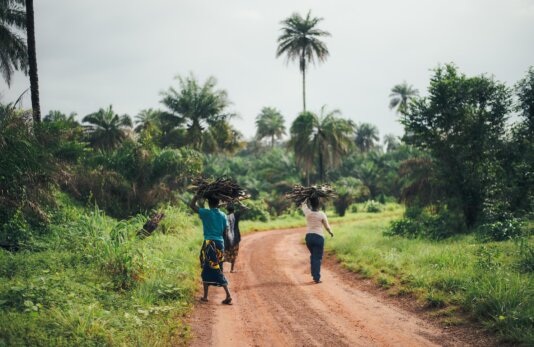- About
- Topics
- Story
- In-Depth
- Picks
- Opinion
- News
- Donate
- Signup for our newsletterOur Editors' Best Picks.Send
Read, Debate: Engage.
| topic: | Women's rights |
|---|---|
| tags: | #agriculture, #Africa, #food security, #gender equality |
| located: | Rwanda, Togo, Ghana, Ethiopia |
| by: | Wanjiru Kamau-Rutenberg |
Countries across Africa are making progress towards gender equality in the agriculture sector, but challenges such as COVID-19 and conflict have undermined these efforts.
In fact, in 2021, Africa was the region with the highest global increase of people suffering from severe or moderate food insecurity. This inhibited progress affects the continent as a whole, with dire ramifications for women. Recognising women as agents of change and leveraging their contributions to Africa's agrifood systems can accelerate the continent's recovery and progress towards gender equality.
Agriculture is a central sector to many African countries’ economies even as women are central to agricultural production across the continent.
Africa has the highest number of women entrepreneurs per capita with 66 per cent of women’s employment being in agriculture. The UN Food and Agriculture Organization (FAO) found that addressing gender gaps in wages in the sector would increase global GDP by nearly USD 1 trillion and reduce the number of food-insecure people by 45 million.
Addressing gender disparities is essential to ensuring a resilient and prosperous future. It doesn't make sense to deny ourselves access to 50 per cent of the talent and brilliance available to solve the challenges facing the continent's agrifood system. The added value is two-dimensional: empowered women, and booming economies. This can be achieved by improving women’s access to finance, information and decision-making - all of which will contribute to their agency in food systems transformation.
Despite recent challenges, several countries have implemented successful policies to empower women as food systems agents of change, as outlined in the most recent Malabo Montpellier Panel report. In turn, they can serve as examples for other countries to follow.
Ethiopia, for instance, has created the Ethiopian Network for Gender Equality in Agriculture (ENGEA) to coordinate interventions to ensure equal access to extension services. The country went on to earn perfect scores for women’s participation in agribusiness at the 2021 Biennial Reviews of the Comprehensive Africa Agriculture Development Programme (CAADP).
As part of several policy measures in recent years, the Ghanaian government has created an agricultural investment package including more than USD 11 million dedicated to subsidising technologies for women. With women comprising around 50 per cent of the agricultural labor force, this investment can have significant impacts going forward.
According to FAO estimates, giving women equal access to resources could allow them to achieve the same yields as men, reducing the number of undernourished people in the world by as much as 150 million.
Rwanda is already leading on women’s inclusion in national-level leadership and politics. Building on this, the country created the National Women’s Council that provides local oversight to ensure women in rural areas are included in decision-making and policy.
Meanwhile, Togo’s advancements have focused on legislation for gender equality. To help reach the national target of ensuring that 20 per cent of rural women have access to productive assets, Togo has passed laws to ensure women’s rights to land ownership and eliminate taxes that hinder women’s entrepreneurship.
While these policy innovations are evidence of commitment to gender equality, progress must be accelerated to help reverse recent increases in hunger and poverty across the continent.
Advancing gender equality also means addressing systemic inequalities. This involves fostering inclusive behavioural change, such as providing education on why gender equality is beneficial for both women and men and how boys and men can contribute. It also means centering women in policy as decision-makers and equally collecting data to benchmark ongoing progress and identify gaps.
Doubling down on commitments already made towards gender equality will also be critical. Many pledges have been made at continental and national levels. However, achieving these goals requires continued dedicated funding, planning and implementation.
From ensuring that Africa's female agricultural entrepreneurs have the resources they need to produce our food to guaranteeing that agricultural researchers and their institutions deliver more gender-responsive innovations for African smallholder farmers, gender equality is at the heart of ensuring an end to hunger and malnutrition on the continent.
Dr Wanjiru Kamau-Rutenberg is a member of the Malabo Montpellier Panel and an Executive in Residence at Schmidt Futures.
Image by Annie Spratt.
